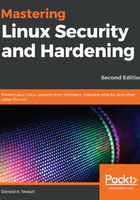
Enforcing strong password criteria
You wouldn't think that a benign-sounding topic such as strong password criteria would be so controversial, but it is. The conventional wisdom that you've undoubtedly heard for your entire computer career says the following:
- Make passwords of a certain minimum length.
- Make passwords that consist of a combination of uppercase letters, lowercase letters, numbers, and special characters.
- Ensure that passwords don't contain any words that are found in the dictionary or that are based on the users' own personal data.
- Force users to change their passwords on a regular basis.
But, using your favorite search engine, you'll see that different experts disagree on the details of these criteria. For example, you'll see disagreements about whether passwords should be changed every 30, 60, or 90 days, disagreements about whether all four types of characters need to be in a password, and even disagreements on what the minimum length of a password should be.
The most interesting controversy of all comes from—of all places—the guy who invented the preceding criteria to begin with. He now says that it's all bunk and regrets having come up with it. He now says that we should be using passphrases that are long, yet easy to remember. He also says that they should be changed only if they've been breached.
And, since the original edition of this book was published, NIST has come to agree with Bill Burr. They have now changed their password implementation criteria to match Mr. Burr's recommendations. You can read about that at
https://www.riskcontrolstrategies.com/2018/01/08/new-nist-guidelines-wrong/.
However, having said all that, there is the reality that many organizations are still wedded to the idea of using complex passwords that regularly expire, and you'll have to abide by their rules if you can't convince them otherwise. And besides, if you are using traditional passwords, you do want them to be strong enough to resist any sort of password attack. So now, we'll take a look at the mechanics of enforcing strong password criteria on a Linux system.
I created an account for Maggie, my black-and-white tuxedo kitty. For her password, I entered the passphrase I like other kitty cats. You may think, "Oh, that's terrible. This doesn't meet any complexity criteria , and it uses dictionary words. How is that secure?" But the fact that it's a phrase with distinct words separated by blank spaces does make it secure and very difficult to brute-force.
Now, in real life, I would never create a passphrase that expresses my love for cats because it's not hard to find out that I really do love cats. Rather, I would choose a passphrase about some more obscure part of my life that nobody but me knows about. In any case, there are two advantages of passphrases over passwords. They're more difficult to crack than traditional passwords, yet they're easier for users to remember. For extra security, though, just don't create passphrases about a fact of your life that everybody knows about.